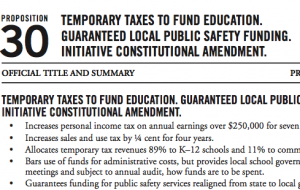Gov. Brown’s stance on Prop. 30 tax extension still in limbo
 Gov. Jerry Brown’s tune keeps changing when it comes to Proposition 30, the successful 2012 ballot measure that raised the state’s basic sales tax until the end of 2016 and income taxes on the wealthy until the end of 2018. His relative silence about a well-funded union-backed effort to extend the income tax hikes until 2030 with a November ballot measure is at odds with most of his history.
Gov. Jerry Brown’s tune keeps changing when it comes to Proposition 30, the successful 2012 ballot measure that raised the state’s basic sales tax until the end of 2016 and income taxes on the wealthy until the end of 2018. His relative silence about a well-funded union-backed effort to extend the income tax hikes until 2030 with a November ballot measure is at odds with most of his history.
In 2012, Brown and other measure backers repeatedly stressed that the tax hikes were temporary. He dismissed critics who said this promise was being made insincerely and his support was seen as crucial to persuading 55 percent of voters to approve the tax increases.
But as soon as the campaign was won, the big players behind Prop. 30 — the California Teachers Union and the California Federation of Teachers, as well as other government unions — indicated that it was an open question whether they would try to extend the increase in either or both taxes.
According to a Nexis search, it was in January 2014 — 14 months after Prop. 30 passed — when behind-the-scenes talk about an extension became public. That’s when state Superintendent of Public Instruction Tom Torlakson, long closely allied with the CTA and CFT, said extensions were needed. Four months later, state Sen. Mark Leno, D-San Francisco, spoke at a hometown rally in favor of more budget dollars for schools and social programs. Leno said extending Prop. 30 made sense because the state’s needs wouldn’t go away when the taxes expired.
After the rally, he told the San Francisco Chronicle, “The state of California will be in sad shape if the money sunsets and there’s no replacement for it.” The Chronicle framed Leno’s statement as putting “him on a collision course with the governor, who used the fixed time limit as a selling point for the measure.”
The same article introduced some telling nuance into Brown’s position. An aide told the Chronicle that the governor “has said that if the state is going to increase taxes, the people will have to vote for it” — reframing his 2012 promise as less than absolute.
Budget revenue rhetoric hinted at fight ahead
But in May 2015, Brown appeared to be returning to his hard line — temporary meant temporary. That month, the state’s Department of Finance put out a revised 2015-16 state budget that seemed to explicitly foreshadow Brown’s opposition to an extension of either or both tax hikes.
The San Jose Mercury News reported that “tucked away on one of the final pages of the 104-page summary of the spending plan was a surprising revelation: Not only will the budget survive when Proposition 30’s temporary taxes are phased out, but general fund revenues are also expected to continue climbing.”
Why would Brown’s budget plan explicitly make this point? To political observers, it felt like a “shots fired” moment.
“Politicians sometimes find themselves in strange positions when the lines of battle shift — and clearly this is one of those times,” Bill Whalen of Stanford’s Hoover Institution told the Mercury News.
It may have seemed clear then. But the expected fight never happened. Union consultants agreed to Brown’s demand that the extension of the Prop. 30 income tax hike — which affects single taxpayers making more than about $260,000 and joint filers making more than $520,000 — not be structured in a way that kept money out of a state rainy-day fund established by voters in 2014. His end of the deal seems to be mostly keeping quiet about the issue.
At a May 13 budget press conference, the governor again refused to decline or endorse the coming campaign to add 12 years to the “temporary” income tax hike. But he hinted at budget pain if it fails.
“If the tax doesn’t pass, we’ll manage. We will have cuts,” Brown said, according to the Sacramento Business Journal.
Chris Reed
Chris Reed is a regular contributor to Cal Watchdog. Reed is an editorial writer for U-T San Diego. Before joining the U-T in July 2005, he was the opinion-page columns editor and wrote the featured weekly Unspin column for The Orange County Register. Reed was on the national board of the Association of Opinion Page Editors from 2003-2005. From 2000 to 2005, Reed made more than 100 appearances as a featured news analyst on Los Angeles-area National Public Radio affiliate KPCC-FM. From 1990 to 1998, Reed was an editor, metro columnist and film critic at the Inland Valley Daily Bulletin in Ontario. Reed has a political science degree from the University of Hawaii (Hilo campus), where he edited the student newspaper, the Vulcan News, his senior year. He is on Twitter: @chrisreed99.
Related Articles
Prop. 39 tax-hike $ also may indirectly boost teacher pay
March 7, 2013 By Chris Reed It’s not just money from Proposition 30’s sales-tax and income-tax hikes that is being
Legislating To Giants
Katy Grimes: This morning, the Assembly took time to honor the San Francisco Giants. A very excited Assemblyman Tom Ammiano,
Happy 25th anniversary, World Wide Web
The Internet was invented in California in 1969 as a government project. But the critical technology, the World Wide Web,



